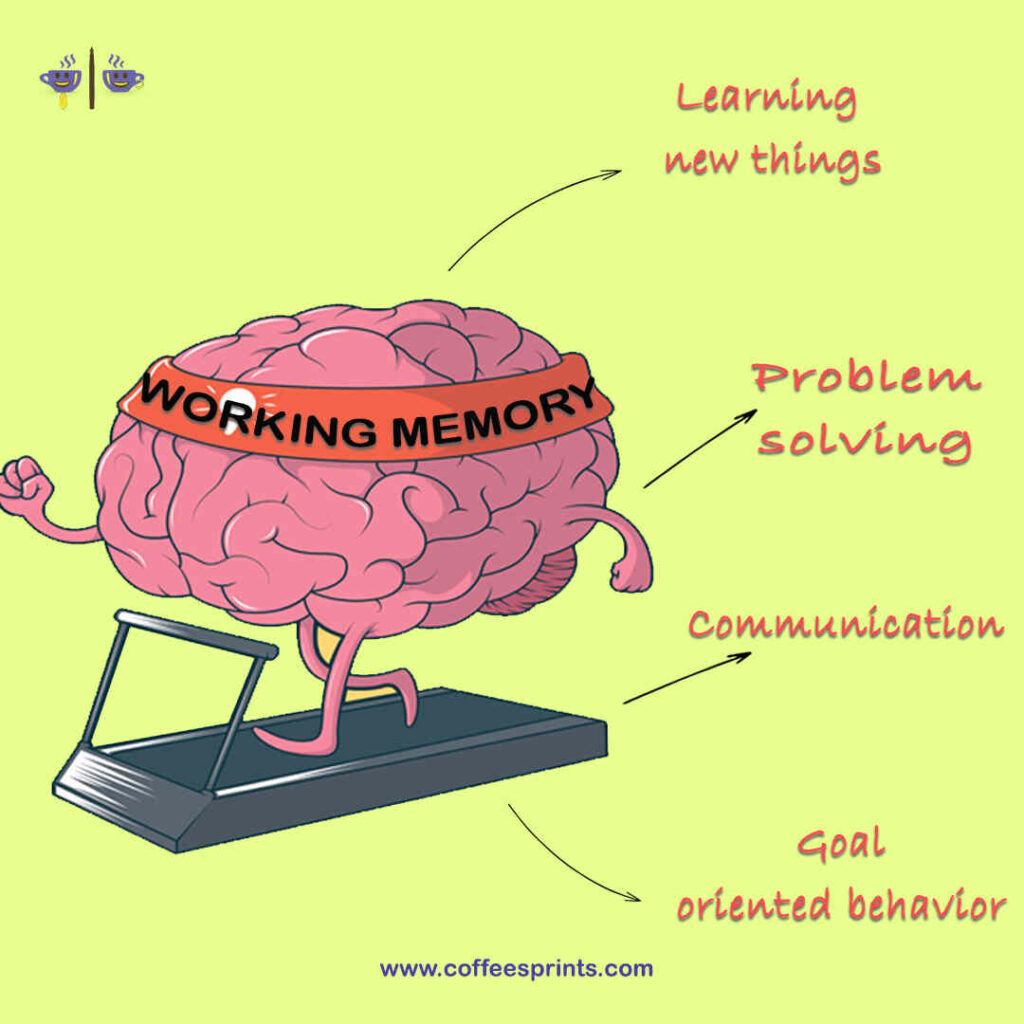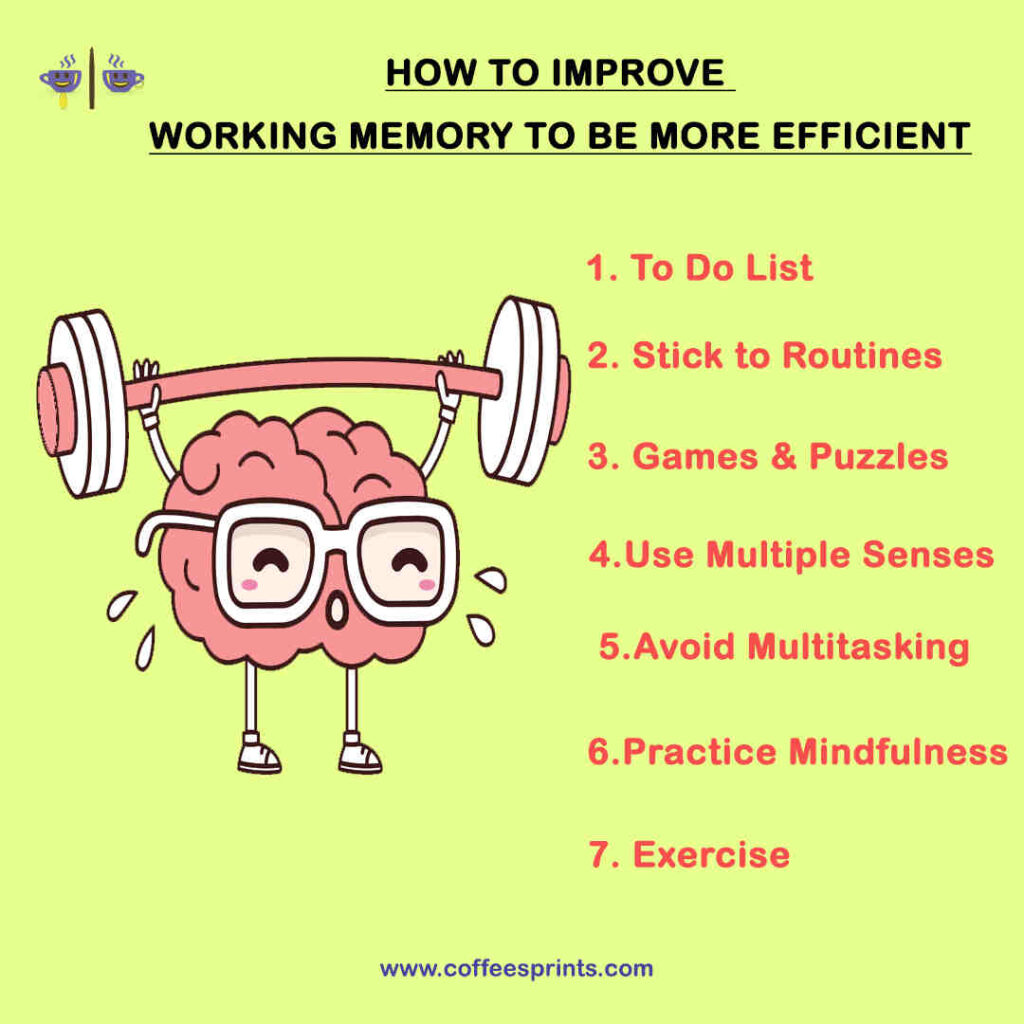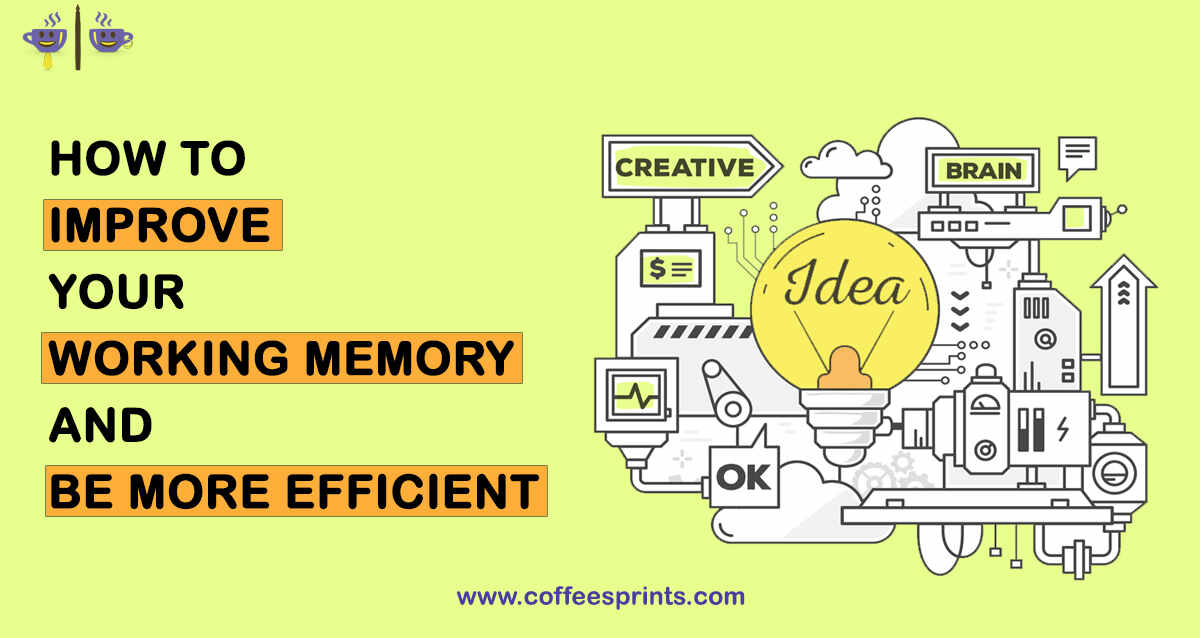We can forget the name of the person we just met, where we set the car keys a while ago.
We’re not alone. It happens to most of us.
While these moments are frustrating, they’re signs of an underlying issue – poor working memory.
We use our working memory as a mental scratchpad when we want to perform tasks that involve learning, reasoning, and comprehension. It’s like a short-term storage tank – we don’t keep things in there forever, but it’s really helpful while we’re working things out.
This article helps you understand why working memory is important in our everyday lives, some examples, and the best ways to improve working memory and be efficient in life.
Here’s a quick peek into the content:
- Why is working memory important?
- Learning new things
- Problem-solving
- Communication
- Goal-oriented behavior
- How to improve working memory to be more efficient
- Break large chunks of information
- Stick to routines
- Games and puzzles to improve working memory
- Come up with your own ways to remember information
- Reduce multitasking
- Practice mindfulness
- Exercise
Why is working memory important?
Before we go into the steps to increase your working memory, let’s understand the importance of it.
Working memory makes it easy to hold and manipulate information temporarily in our minds. So we can work on the tasks at hand and make decisions like what shirt to choose at the moment.
Here are a few other reasons:

Learning new things
Sometimes when you learn new stuff, it can be hard to keep it all straight in your head. That’s where working memory comes in – it helps you hold onto and play around with new information for a little bit until you can understand it better and remember it.
For example, when you’re reading something, your working memory helps you hold onto the words and meanings long enough to make sense of the whole sentence. And as you keep reading, your working memory connects the new info with what you’ve already learned.
Eventually, your brain decides which info is important enough to keep for later, and it gets stored in your long-term memory.
Problem-solving
When you’re trying to solve a problem, you need to be able to hold multiple pieces of information in your head at the same time. Working memory allows you to keep important things in mind while you work through a problem, and to manipulate that information in various ways as you try out different solutions.
For example, let’s say you’re trying to solve a math problem. You need to remember the numbers and operations you’re working on within your working memory so you can perform the calculations and arrive at a solution. Or, if you’re trying to solve a puzzle, you might need to hold in mind the different pieces and their possible configurations while you try to fit them together.
Without our working memory, problem-solving would be much more difficult and time-consuming!
Communication
Have you ever been in a conversation where you’re trying to remember something that someone just said, or trying to follow along with a complex idea? That’s our working memory playing its role – it helps us keep track of information in real time so we can communicate effectively with others.
We come up with words, concepts, and ideas that someone is sharing with us, so we can process and understand them. We also retrieve information from our own long-term memory that might be relevant to the conversation using our working memory.
For example, if someone is talking about a movie you’ve seen before, your working memory might help you recall details about the plot or characters.
Without working memory, it would be much harder to follow along with conversations, express our own ideas clearly, or make meaningful connections with others.
So next time you’re chatting with someone, remember to thank your working memory for helping you keep up!
Short on time? Check out this video to get an overview of how to improve your working memory.
Goal-oriented behavior
Working memory plays a really important role in helping us stay on track and achieve our goals.
You set a goal for yourself, like studying for an exam or saving up money for a trip using working memory.
Working memory is responsible for breaking down our goals into smaller steps. For example, if your goal is to study for an exam, your working memory can help you remember which topics you need to cover and how much time you have to study each day. And as you work through each step, your working memory helps you stay focused and motivated.
We resist distractions and stay right on track, thanks to our working memory!
It helps us filter out irrelevant information and stay focused on what’s important. This is especially helpful when we’re working toward a long-term goal and need to stay focused over an extended period of time.
How to improve working memory to be more efficient
Here are some ways to increase your working memory capacity.

Break large chunks of information
We can’t remember everything, and we know that. While limitations of memory can vary from person to person, depending on our working memory, everything can be hard. If that’s the case, at every step of our day or activity, we need to pause and think, ‘What am I supposed to do next?’ These situations often make us distracted and get off track.
Not everyone runs on lists. But if you’re someone who is struggling to organize your goals and activities, a to-do list can save you time and energy.
Stick to routines
We’re adding some amount of stress to our lives each time we put some effort into making a decision. We can’t get rid of decision-making in our daily lives, but we can definitely minimize it by sticking to routines.
Besides, our focus of attention improves as other (working) memory processes get automated. So it is important to have a routine. Routines can be fun and don’t have to be boring.
Having routines is a stress- and sanity-saver, especially after the new normal.
Games and puzzles to improve working memory
Memory games are a fun way to exercise your brain and increase its capacity. These games challenge the gray areas of the brain and help them sharpen further. Therefore, it’s easier to learn and retain new information better.
Games such as Crossword puzzles, Jigsaw puzzles, tongue twisters, Chess, and Sudoku can increase concentration, strategic thinking, and problem-solving skills. Focus on one challenge or game per day so you don’t exhaust your mind.
Come up with your own ways to remember information
Using multiple senses to process information will benefit not only working memory but also long-term memory. For example, writing the information and saying it out loud or using visual skills like relating a piece of information to an image in your mind can do the trick.
Reduce multitasking
Do you know that the same part of the brain is responsible for working memory as well as concentration? Interesting, right?
If a complex task demands your full attention, try to reduce distractions. When you are performing such tasks, do one thing at a time. By avoiding multitasking, your brain will process the information better.
Here’s how you can do it:
- Put your mobile and screens away
- Focus on one task at a time
- Cut back on obligations – Commit only to the activities and meetings that really matter
- Use white noise, pink noise, or background ambient music to prevent distractions
Practice mindfulness
Mindfulness helps calm our body and mind. Training ourselves in attention and awareness through meditation and mindfulness would foster calmness, concentration, and clarity, which will further enhance our working memory. So practice mindfulness meditation for at least ten minutes a day to make your brain more efficient.
Exercise
Some research shows that exercise improves our thinking and learning skills. You can choose any form of exercise like yoga, or cardio workouts, and include them in your routine to get that brain boost. It can also improve your mood, reduce stress, and make your sleep better – all the areas that affect your cognitive functions.
To sum it up!
While these tips are not a cure-all for working memory problems, they can be effective tools for memory improvement arsenal. Practicing these methods regularly and incorporating them into your schedule would help you remember more and improve your working memory in no time.

2 thoughts on “How to improve your working memory and be more efficient”
Well done!! Exactly what I was looking for.
Great Post, Thanks for sharing this amazing blog.